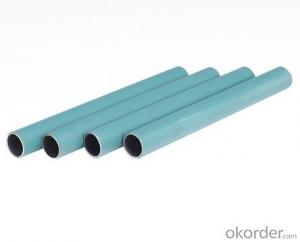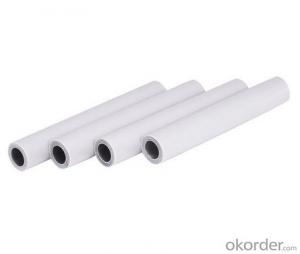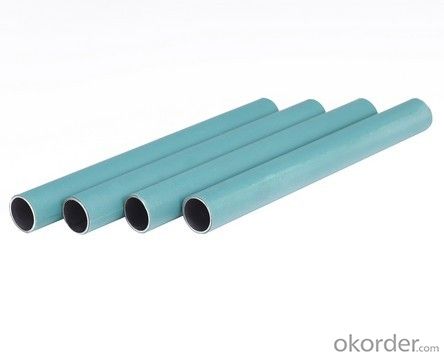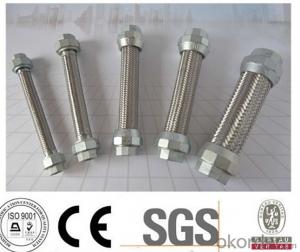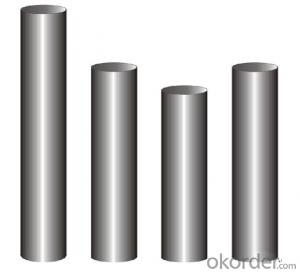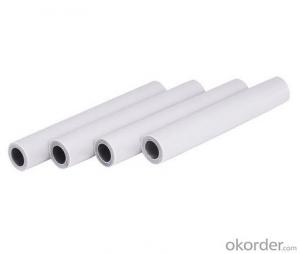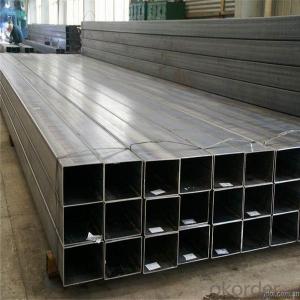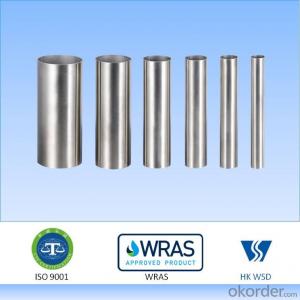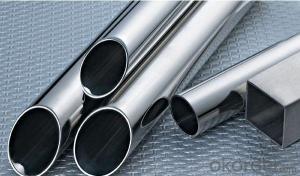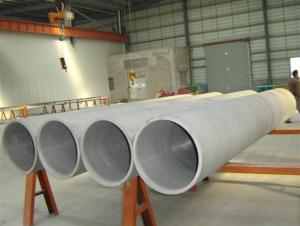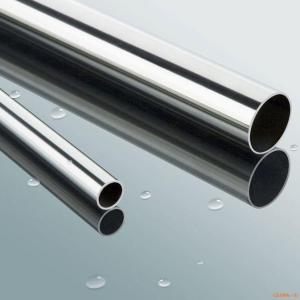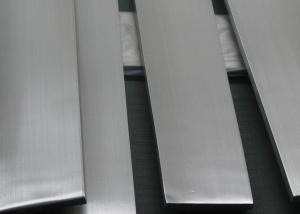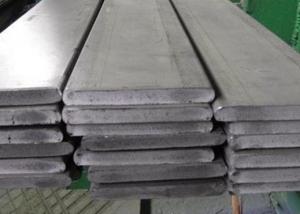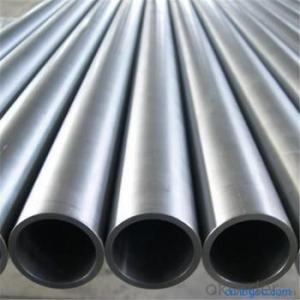Stainless Steel corrosion resistance Pipe Stainless Steel Tube 304/316L
- Loading Port:
- Huangpu
- Payment Terms:
- TT OR LC
- Min Order Qty:
- 100 pc
- Supply Capability:
- 100000 pc/month
OKorder Service Pledge
OKorder Financial Service
You Might Also Like
Specification
WELCOME to visit our stainless steel products here(^_^)
Press fitting system joins pipe without welding or bolting. The components fit by crimping through the use of a special pressing tool. An O-ring that is inserted in the fitting ends of the pipe ensures a leak-proof connection. Press fitting system is the trend of pipeline industry. It is widely used in cold and hot water supply, heating supply, fire protection, medicinal gas, industrial petroleum pipeline system etc.
For the size, now we have 3 series:
1. Out diameters: 16.0, 20.0, 25.4, 32.0, 40.0, 50.8, 63.5, 76.1, 88.9, 108.0 (GB/T 19228.2-2011)
2. Out diameters: 15.88, 22.22, 28.58, 34.0, 42.7, 48.6, 76.1, 88.9, 101.6 (JIS G3448-1980)
3. Out diameters: 15, 18, 22, 28, 35, 42, 54, 76.1, 88.9, 108 (EN 10312:2002)
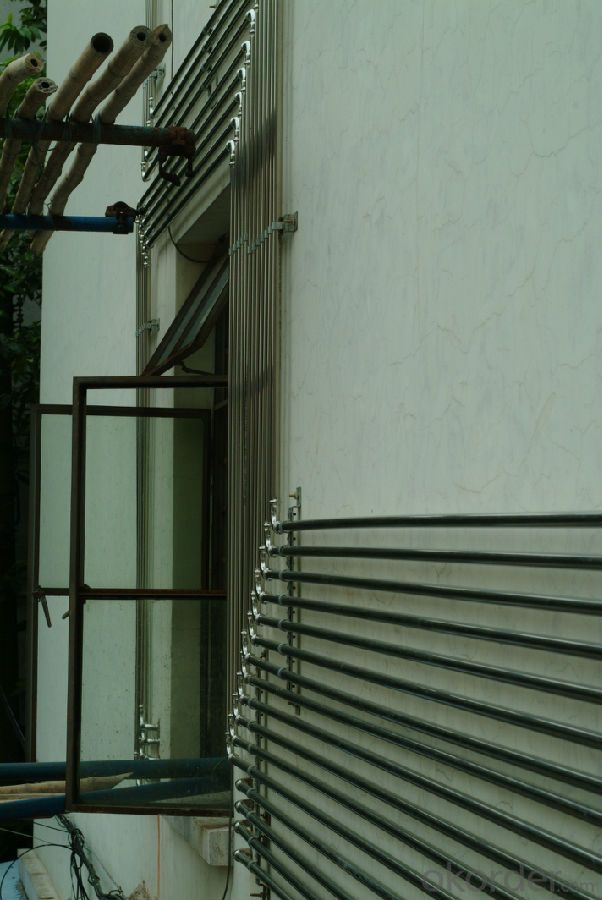
Technical information:
-- Material: Stainless steel 304 and 316L available.
-- Max working pressure 1.6MPa (equal to 232 psi), testing water pressure: 2.5MPa (equal to 362.5psi).
-- Working temperature from -20 to 110 degree centigrade (with Chlorinated butyl rubber O ring),
-- Suit medium: Cold water, hot water, compressed air, gas, oil etc
The product features as below:
1, thin wall stainless steel pipe could last for 70 years, it is the same life time with normal buildings.
2, no smell, no rusty.
3, recycle material
4, avoid welding, avoid fire dangerous.
Contact us for more details!
- Q: Can stainless steel pipes be heat treated?
- Yes, stainless steel pipes can be heat treated. Heat treatment is a process that involves heating the stainless steel pipe to a specific temperature, holding it at that temperature for a certain period of time, and then cooling it down in a controlled manner. This process is typically done to alter the mechanical properties of the stainless steel, such as increasing its hardness or improving its strength. Heat treatment can also be used to relieve stress or remove impurities in the stainless steel pipe. However, it is important to note that not all grades of stainless steel can be heat treated, as the composition of the alloy plays a significant role in its heat treatability. It is recommended to consult the manufacturer or a metallurgical expert to determine the appropriate heat treatment process for a specific stainless steel pipe.
- Q: Are stainless steel pipes suitable for oil and gas applications?
- Yes, stainless steel pipes are suitable for oil and gas applications. Stainless steel is highly resistant to corrosion, making it ideal for transporting and storing oil and gas, which often contain corrosive elements. Stainless steel pipes also have high strength and durability, ensuring they can withstand high-pressure conditions and harsh environments. Additionally, stainless steel is easy to clean and maintain, reducing the risk of contamination in oil and gas operations. Overall, stainless steel pipes are a reliable and cost-effective choice for oil and gas applications.
- Q: How are stainless steel pipes graded?
- Stainless steel pipes are graded based on a variety of factors to determine their quality and suitability for different applications. The grading system of stainless steel pipes typically takes into account factors such as their chemical composition, mechanical properties, and manufacturing process. One of the key aspects of grading stainless steel pipes is their chemical composition, which refers to the specific elements and their quantities present in the alloy. The most common elements found in stainless steel pipes include chromium, nickel, molybdenum, and carbon. The percentage of these elements affects the corrosion resistance, strength, and durability of the pipes. Different grades of stainless steel pipes have varying compositions, allowing them to be used in diverse environments and applications. Another important factor in grading stainless steel pipes is their mechanical properties, such as tensile strength, yield strength, and elongation. These properties determine the structural integrity and performance of the pipes under different conditions. Higher grades of stainless steel pipes generally possess superior mechanical properties, making them suitable for high-pressure and high-temperature applications. The manufacturing process also plays a crucial role in grading stainless steel pipes. The pipes undergo various processes, including hot rolling, cold rolling, and heat treatment, to shape them and enhance their properties. The quality of the manufacturing process greatly affects the final grade of the stainless steel pipes. Pipes that are produced using advanced techniques and stringent quality control measures are typically assigned higher grades. In summary, stainless steel pipes are graded based on their chemical composition, mechanical properties, and manufacturing process. These grading criteria ensure that different grades of stainless steel pipes are available to meet the specific requirements of different industries and applications.
- Q: Can stainless steel pipes be used for chemical reactors?
- Indeed, chemical reactors can utilize stainless steel pipes. Stainless steel emerges as a favored selection for chemical reactors primarily because of its remarkable corrosion resistance properties. It exhibits an exceptional ability to resist chemical reactions and endure the severe conditions and corrosiveness associated with numerous chemicals employed in industrial procedures. Furthermore, stainless steel showcases remarkable strength and durability, rendering it appropriate for managing high-pressure and high-temperature scenarios frequently encountered in chemical reactors. Moreover, stainless steel can be effortlessly cleaned and maintained, a critical aspect in preserving the purity and integrity of the chemicals being treated. All in all, stainless steel pipes prove to be a dependable and effective option for chemical reactors.
- Q: What is the maximum pressure rating for stainless steel pipe fittings?
- The maximum pressure rating for stainless steel pipe fittings varies depending on several factors such as the material grade, size, and temperature. Generally, stainless steel pipe fittings can handle high-pressure applications due to their inherent strength and corrosion resistance. The pressure rating of these fittings can range from 150 psi (pounds per square inch) to as high as 10,000 psi, depending on the specific fitting and its intended use. It is essential to consult the manufacturer's documentation or industry standards such as ASME B16.11 or ASME B16.9 to determine the maximum pressure rating for a specific stainless steel pipe fitting. Additionally, it is crucial to consider other factors such as the type of sealing method used, compatibility with the fluid being conveyed, and any additional safety measures required in high-pressure systems.
- Q: Can stainless steel pipes be used for solar thermal systems?
- Yes, stainless steel pipes can be used for solar thermal systems. Stainless steel is highly corrosion resistant and can withstand the high temperatures and pressures typically found in solar thermal systems. It is a reliable and durable choice for transporting the heat transfer fluid in these systems.
- Q: How do stainless steel pipes compare to other materials like carbon steel or PVC?
- Stainless steel pipes have several advantages over other materials such as carbon steel or PVC. Firstly, they are highly resistant to corrosion, making them suitable for use in various environments, including those with high humidity or exposure to chemicals. Additionally, stainless steel pipes have excellent strength and durability, allowing them to withstand high pressures and temperatures. They also have a smooth internal surface, which reduces friction and minimizes the risk of clogs or blockages. While carbon steel pipes may be less expensive, stainless steel pipes offer superior longevity and performance. PVC pipes, on the other hand, are lightweight and cost-effective but may not be as durable or resistant to extreme conditions as stainless steel. Overall, stainless steel pipes are a reliable and versatile choice for many applications.
- Q: Can stainless steel pipes be used for nuclear applications?
- Yes, stainless steel pipes can be used for nuclear applications. Stainless steel is commonly used in nuclear power plants due to its excellent corrosion resistance, high strength, and ability to withstand high temperatures. It is particularly suitable for applications where the pipes come into contact with various nuclear substances or corrosive environments. Stainless steel pipes are used for transporting and containing nuclear materials, such as coolant, steam, and radioactive waste. They are also used in the construction of nuclear reactors, where the pipes need to withstand extreme conditions, including high pressure and radiation exposure. Additionally, stainless steel pipes offer long-term durability and reliability, making them a preferred choice for nuclear applications.
- Q: How do stainless steel pipes perform in extreme weather conditions?
- Stainless steel pipes perform exceptionally well in extreme weather conditions due to their high resistance to corrosion, heat, and cold. They can withstand extreme temperatures, heavy rainfall, snow, and intense sunlight without deteriorating or losing their structural integrity. This makes them a reliable choice for various applications in industries such as oil and gas, construction, and marine environments.
- Q: Can stainless steel pipes be used for boiler tubes?
- Yes, stainless steel pipes can be used for boiler tubes. Stainless steel possesses excellent corrosion resistance, high strength, and heat resistance, making it a suitable material for boiler tubes that are subjected to high temperatures and pressure. Additionally, stainless steel's durability and long lifespan make it a popular choice for boiler applications.
Send your message to us
Stainless Steel corrosion resistance Pipe Stainless Steel Tube 304/316L
- Loading Port:
- Huangpu
- Payment Terms:
- TT OR LC
- Min Order Qty:
- 100 pc
- Supply Capability:
- 100000 pc/month
OKorder Service Pledge
OKorder Financial Service
Similar products
Hot products
Hot Searches
Related keywords
